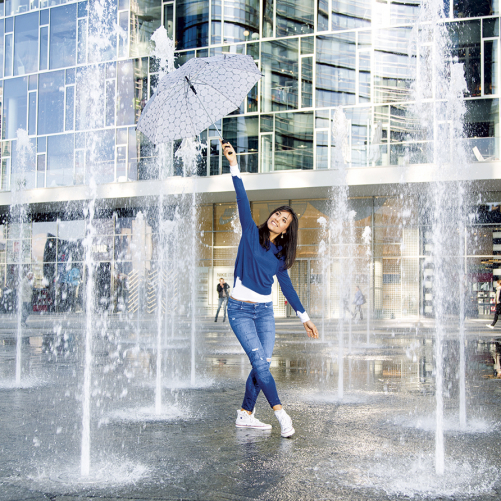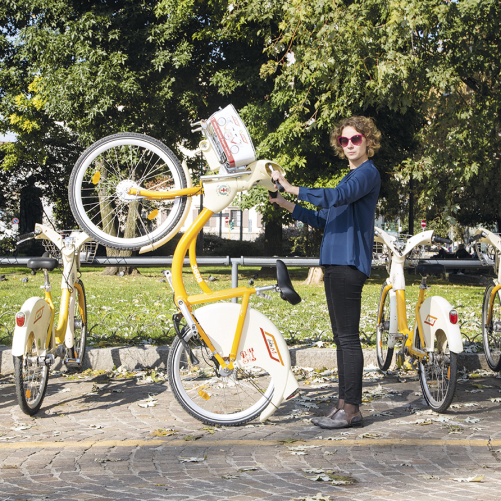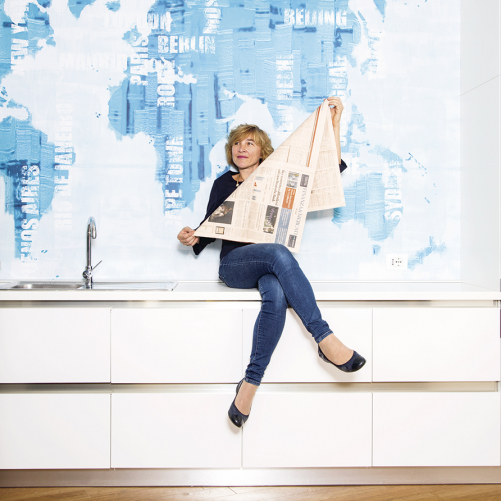Smart Working: From Innovation in the Workplace to Creating Shared Value
According to data from the Smart Working Observatory at the Polytechnic Institute of Milan(3), there are around 250,000 ‘smart workers’ in Italy, that is, 7% of the tertiary workforce (employees, executives, and company heads) up by 40% compared to 2013.
At Mazars in Italy, the reinvention of company spaces was devised first and foremost as a mental process and a long-term project. ‘In the beginning, it was about transferring the Mazars’ Italian headquarters to the centre of Milan, dictated by the need to bring together several teams. The size and configuration of the premises both suggested and allowed a change in mindset through a new approach to work,’ explains Pascal Jauffret, managing partner of Mazars in Italy.
This stance translates into spaces designed for three to four people in well-lit rooms, desks are allocated on a first-come-first-served basis, and there are no assigned spaces to any particular person. There are no labels or names: staff members settle wherever they like in available areas, in a fluid work dynamic. ‘In this way, the exchange of information is very efficient, with a start-up style atmosphere, where the classic rules are turned on their head so that people feel free to move around within their everyday routine,’ says Jauffret.
|
Veronica Coffani |
Daniela Ricci |
For Lorenzo Milani, senior manager, the choice of location for a professional services firm is far from neutral: ‘Working in the heart of the nation’s financial capital is aspirational for us as tax specialists. Being in the centre of the business community is both gratifying and very motivating.’
Other staff members go further, mentioning a connection between geographic location and flexibility. ‘Being at the nerve centre of economic life is crucial in our context, especially from the point of view of managing client relationships. We would probably be able to enjoy larger offices if we were further out of town, but the new organisation gives us genuine flexibility in how we organise our missions’, insists Laura Verrascina, an audit manager specialising in the industrial sector.
She is keen to expand on this point, directly referring to the importance of human, face-to-face interaction(4): ‘In our jobs, which aim to deliver high value-added services, communication is key: I envisage my future work environment as being completely manageable outside of the office, yet without sacrificing the human connection, either with my colleagues or my clients.’ In essence, this underlines the fact that the work dynamic is bound to become increasingly flexible.‘Smart means feeling independent in how you organise your time,’ reasons Verrascina, who points out that ‘innovative work organisation can only be legitimate when it matches the needs and demands of the individual. If ‘smart working’ is a goal (as well as a necessity) for many of us, it is notably about attaining a better work/life/travel balance.’
The Milan management is clear about its new approach: the aim is also to take everyone out of their comfort zones and to help them focus on the company’s external stakeholders – the first being the client – right in the middle of the living, breathing heart of the city. By choice, the organisation does not have enough office space for all staff to be present at once. If desks are in too high demand, people can work from home, in other collaborative spaces, in public shared spaces, or even in the client’s offices: this is the principle of ‘hot desking,’ applied at Mazars’ Milan offices.
The Importance of ‘Collision’ Between Individuals
‘Sometimes moving around, exploring, engaging and increasing the chances of ‘collision’ between people is even more important than individual productivity or creativity,’ says Pascal Jauffret, alluding to the concept of serendipity (5). Translated into daily life via the organisation of spaces, the goal of allowing such collisions can be summed up at Mazars in Milan with a single word: lounge. The lounge is a room people pass through, a place to share; it is the high point of a dynamic that goes beyond the quiet work zone of free deskspace rooms, facilitating interaction through relaxation and play.
In a quite deliberate way, this space is also the entrance area, for staff but also for outside visitors, leading to the maze of workspaces. It is a convivial zone where people can get together around a video game console, or table football while observing the comic strips on the walls: ‘It is possible to play several roles at Mazars, without compromising for even a second on our standards of quality, service, and excellence,’ adds Jauffret.
According to partner Marco Lumeridi: ‘It is a kind of ‘collision’ that propels us into the long term because it helps us to attract talent that is both young – in Italy, the average age at Mazars is 28– and particularly creative. This also applies to the auditor’s job, which will have completely changed within a few years. Nobody can predict exactly where automation is going to lead us in the area of accounting, auditing or consulting. Recruiting adaptable staff is therefore the key element that will enable us to change at least as quickly as the technology. This approach will also allow us to manage our human resources efficiently.’ Given that these new organisational principles and space sharing practices apply at every level of hierarchy, the facilitation of transmission between generations is one of the benefits expected from this revolution.
|
Lorenzo Milani, Laura Verrascina and Sabrina Delfino |
Paola Negri |
From Traditional Italian Craftsmanship to ‘Smart Working’
Investigating the evolution of work environments also means taking a step back to consider that offices have a significance which goes well beyond mere real estate value. Jon Fredrik Baksaas, CEO of the Norwegian company Telenor, asked for his head office to be designed not as a real estate asset, but as a communications tool; from this point of view, the company’s strategy and the initiatives it adopts become more important than the notions of cost and efficiency(6). It is a big difference compared to the past. The Italian reinvention of work style made in Mazars is characterised by a stronger valuation of both workspaces and community life within the company. This approach is part of a 360-degree strategy, and it is working, as evidenced by the establishment of the Mazars University headquarters in Milan; the creation of teams mixing professions and nationalities; and international recruitment. The big picture is about overall innovation, starting with high value added by the new work dynamic.
A curious aspect of this approach is perhaps that the roots of this smart innovation reach back to national cultural tradition. ‘This way of working recalls a very old idea: the bottega (plural botteghe, or workshops) of 15th century Italian Renaissance. The result had been the emergence of a kind of entrepreneurship that came up with a revolutionary way of working, designing and delivering products and services(7).
If ‘smart working’ represents an innovative way of seeing things, this notion equally recalls the historical concept of those workshops, whose three main principles were the translation of ideas into actions, the promotion of debate and the facilitation of convergence between art and science, all without neglecting the commercial and pragmatic side – the business side, as we would say today.
For Veronica Coffani, executive assistant at Mazars, allowing this new link between private and professional life, as in the botteghe of olden days, forecasts in an ideal way the evolution of her current job.
In her opinion, ‘this is also a workplace and work style that makes it easier to organise access to nurseries, gyms or other services.’ An opinion shared by Sabrina Delfino, audit manager, who adds: ‘Beyond the search for a better work/life balance, technology and smart management of time and human resources should also allow for evaluation of work by objectives and not by tasks, with complete digitalisation of tools and processes.’
To organise workspaces differently and, in reality, the work itself, actually serves an even more ambitious objective. ‘Our new organisational modes allow a much better convergence of the interests of the organisation and the people who work there,’ argues Marco Croci, a partner specialising in audit and financial advisory services. ‘The condition for success of such a model is that the leadership of the organisation believes in the importance of the teams being involved in choices that concern them, and more generally, in the many decisions of the company. In other words, only when leadership is shared does collective intelligence become a reality.’ The secret to creating shared value is without a doubt that everything starts with people and their aspirations(8).
(1) ‘The future of work: a revolution in progress. A study of one year of conversations on the social web’ in Creating Shared Value – Mazars Group Yearbook 2015, pp. 34 sq. http://annualreport.mazars.com?
(2) http://www.ilsole24ore.com/art/notizie/2016-01-29/addio-telelavoro- debutta-smart-working-lavorare-casa-aumenta-produttivita-125526. shtml?uuid=ACbNXoJC et http://www.ilsole24ore.com/art/impresa-e- territori/2016-06-02/smart-working-attraversare-quarta-rivoluzione- industriale-210916.shtml
(3) http://www.ilsole24ore.com/art/impresa-e-territori/2016-10-12/smart- working-e-boom-2016-terzo-grandi-imprese-e-flessibile-172346.shtml
(4) ’Workspaces that move people‘, Harvard Business Review, https://hbr. org/2014/10/workspaces-that-move-people?
(5) Anglo-American term meaning ‘capacity, art of making a discovery, notably scientific, by accident’ (Larousse).
(6) Id.?(7) Piero Formica, The Innovative Coworking Spaces of 15th-Century?Italy, Harvard Business Review, https://hbr.org/2016/04/the-innovative- coworking-spaces-of-15th-century-italy?(8) ‘About Shared Value’ in Creating Shared Value – Mazars Group Yearbook 2015, pp. 35 sq. http://annualreport.mazars.com




